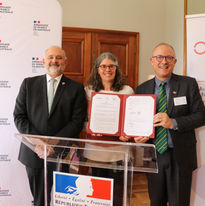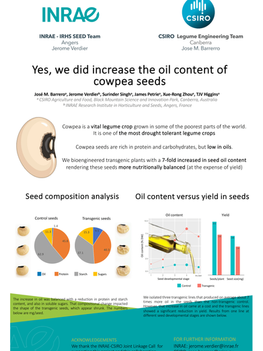SEMINAR – Agrifood scientific community launch (30/04/2025)
About the event
🇫🇷🇦🇺 Strengthening French–Australian Collaboration: Launch of the AFRAN Agricultural and Food Sciences Community
📍 Canberra, April 30, 2025
The Residence of France in Canberra hosted close to 100 participants, in-person and online, for the launch of the AFRAN Agricultural and Food Sciences Community during the Agri-Food Seminar. This new community marks a major milestone in French–Australian scientific cooperation on agriculture, sustainable food systems, and climate resilience.
Led by Dr Jean-François Hocquette (INRAe, France) and Dr Andy Sheppard (CSIRO, Australia), the community fosters dialogue between researchers, policymakers, and industry stakeholders across France, Australia, and French territories in the Indo-Pacific. It also extends AFRAN’s scope into climate adaptation and food security sciences in the Pacific and Indian Ocean regions, aligning with the bilateral cooperation roadmap.
🌾 Panel 1 – Main challenges for sciences in Agri-Food: Australian & French perspectives
The first panel focused on the urgency of transforming agri-food systems to meet sustainability goals, boost productivity, and ensure food security. Chaired by Dr Jared Greenville, ABARES’ executive director, the session included high-level speakers: Mr Philippe Mauguin, Chair and CEO of INRAe, Dr Alison Bentley, Deputy Director of Agriculture and Food at CSIRO, Prof Damien Field, Director of Sydney Institute of Agriculture at the University of Sydney, and Dr Jean-François Hocquette, Research Director and Science Officer for International Relations for Australia and New Zealand at INRAE.
Speakers emphasized the need to strengthen international collaboration—especially between France and Australia—while encouraging interdisciplinary approaches that connect agriculture, environment, economy, and social sciences, among others, in order to address challenges arising from diverse fields such as science, policymaking, and environmental protection.
Key issues discussed included progressing genetics and advanced technologies in plant and animal breeding; addressing the complexity of land allocation; and tackling challenges such as zoonoses, food traceability, water allocation and climate change. The role of cover crops and untapped areas was explored in relation to resource optimisation, with a call for systemic changes in production models.
Panellists stressed the necessity of reorganising scientific institutions to break silos, promote agroecology, and connect productivity with biodiversity and sustainaibility. There was also strong advocacy for co-constructing solutions with farmers rather than imposing top-down models, and for securing farmer incomes through performance-based indicators rather than relative benchmarking.
Concerns were raised about the need to better interoperate AgTech solutions on farm, the unintended consequences of AgTech and the lack of data transparency, especially from private companies. Calls were made for open-access research and a shift toward science-based policymaking. Differences between France and Australia—such as focus on organoleptic quality and diversity versus volume and compliance—were seen as learning opportunities.
🔑 Key points:
-
Reorganize science to address complex, cross-sectoral challenges;
-
Progress research and innovation to improve production capacity;
-
Boost adoption of progressive (agroecological) practices and technologies through dedicated extension funding;
-
Promote biodiversity, environmental and soil health through advanced monitoring tools (e.g., eDNA);
-
Ensure farmer participation through co-design and knowledge exchange;
-
Address gaps in education and improve the appeal of agri-food careers;
-
Develop robust, holistic performance metrics that reward sustainability.
♻️ Panel 2 – Research and innovation for post-farmgate challenges
This session tackled the often-overlooked "post-farmgate" phase of agri-food systems. It was chaired by Ms Francesca Goodman-Smith, Acting Research, Development and Extension Director at End Food Waste Australia, and included key experts Dr Pablo Juliano, Food Processing and Supply Chains Group Leader at CSIRO, Dr Marie Mourad, Zero Waste and Sustainability Consultant and A/Prof Bree Hurst, Chief investigator at the Centre for Agriculture and Bioeconomy at QUT.
After recalling food loss and waste impacts, this matter was framed also as a great and untapped source of innovation and of economic value. Circular economy was central to the discussion, particularly the concept of upcycling—transforming food waste into valuable products. Challenges discussed included the absence of clear regulations, the lack of reliable data, and the need for market opportunities to develop solutions to food loss and waste, particularly solutions which use the whole lost or wasted product. A recurring theme was the need for holistic impact assessments that balance economic benefits with social and environmental concerns.
Australia's internal market limitations and regulatory voids were discussed as increasing the risk of food going to loss or waste, and as barriers to scaling innovations. Panellists emphasized the need for systemic reforms and upstream interventions, such as clearer expiry labelling and behavioural shifts in the food service industry. Also, regarding the cohesion of supply chains, weak contracts, lack of infrastructure and market concentration were identified as factors pressuring primary producers.
🔑 Key points:
-
Frame food loss and waste reduction as an opportunity, not just a problem;
-
Address structural barriers: market concentration, imbalanced contracts, regulatory imperfections, and data gaps;
-
Promote upstream prevention strategies and behavioural change, with policies adapted to local and cultural contexts;
-
Invest in infrastructure to enable circular solutions.
🌍 Panel 3 – One Health: Agricultural Science in our changing world
The final panel focused on the One Health approach, which seeks to integrate human, animal, plant, and ecosystem health. Chaired by Dr Andy Sheppard, DAFF-CSIRO Catalysing Australia’s Biosecurity Initiative Co-Executive Director and Chief Research Scientist at CSIRO, and Dr Jean-François Hocquette, the session highlighted high-valued researchers: Dr Sam Hamilton, Deputy Australian Chief Veterinary Officer for DAFF, Dr Sophie Molia, Veterinary socioepidemiologist at CIRAD, Dr Robyn Alders, Veterinarian and Honorary Professor at the Development Policy Centre at ANU, Prof Ricardo Soares Magalhães, Director of the Queensland Alliance for One Health Science at UQ and Dr Marisa Peyre, PREZODE Co-founder and Global Science Leader.
Panellists acknowledged that “One Health”, which began as a focus on zoonotic diseases, now aims to tackle broader systemic risks, including climate change, non-communicable diseases, and rising inequality.
They argued for shifting from coordination to investment logic—positioning One Health as a key to sustainable development, and proving its economic benefits. Attracting funding for the implementation of “One Health” would indeed be easier through proving a return on investments, especially on reducing the prevalence of non-communicable diseases.
Emphasis was also placed on local engagement, interdisciplinary research, and culturally inclusive governance to ensure stocktaking of local and ancestral knowledge, with the example of Aboriginal communities of Australia. Communication and education—especially among policymakers—were seen as vital to implementing effective One Health strategies.
The Pacific region was highlighted as a priority area, in terms of both vulnerability and action, noting that France and Australia both have a responsibility to address regional challenges around food security. Although speakers flagged the need to secure funding for regional research programs, this was also noted as less an issue than its optimal distribution, hand in hand with Pacific Island countries.
🔑 Key points:
-
Pilot “One Health” as a strategic investment with financially measurable returns;
-
Promote inclusive governance structures and cross-sector collaboration;
-
Expand focus to include plant health and environmental sustainability;
-
Engage communities locally to ensure relevance and resilience;
-
Support education and awareness to build societal and political buy-in;
-
Use initiatives like PREZODE to support localised, Pacific-driven strategies.
💬 Discussions
During the Q&A session, the discussion shifted toward redefining food sustainability and security through the lens of a “One Food System” approach—addressing challenges across the entire food supply chain while prioritizing public health and nutritional quality. Some participants highlighted the French food culture, where eating is not merely a necessity but a form of art.
🚀 Looking Ahead
The event marked a new chapter in French–Australian scientific partnership, grounded in shared goals and complementary expertise. The AFRAN Agricultural and Food Sciences Community is now positioned to advance high-impact research, strengthen regional resilience, and shape the future of sustainable agri-food systems.
🙏 Special thanks to:
-
H.E. Pierre-André Imbert, Ambassador of France to Australia, for hosting.
-
All panellists and attendees for their contributions.
-
The AFRAN network for making this community possible.
See the program and panellists slides here
.png)

.png)



















